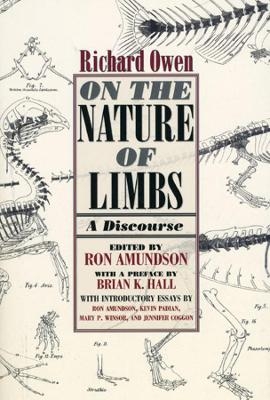
On the Nature of Limbs
A Discourse
Seiten
2008
University of Chicago Press (Verlag)
978-0-226-64194-2 (ISBN)
University of Chicago Press (Verlag)
978-0-226-64194-2 (ISBN)
- Titel z.Zt. nicht lieferbar
- Versandkostenfrei
- Auch auf Rechnung
- Artikel merken
Just as Darwin's ideas continue to propel the modern study of adaptation, so too Richard Owen's contributions fuel the interest in homology, organic form, and evolutionary developmental biology. This title offers his theory of the archetype and his views on species origins.
The most prominent naturalist in Britain before Charles Darwin, Richard Owen made empirical discoveries and offered theoretical innovations that were crucial to the proof of evolution. Among his many lasting contributions to science was the first clear definition of the term homology: "the same organ in different animals under every variety of form and function." He also graphically demonstrated that all vertebrate species were built on the same skeletal plan and devised the vertebrate archetype as a representation of the simplest common form of all vertebrates. Just as Darwin's ideas continue to propel the modern study of adaptation, so too will Owen's contributions fuel the new interest in homology, organic form, and evolutionary developmental biology. His theory of the archetype and his views on species origins were first offered to the general public in "On the Nature of Limbs", published in 1849. It re-emerges here in a facsimile edition with introductory essays by prominent historians, philosophers, and practitioners from the modern evo-devo community.
The most prominent naturalist in Britain before Charles Darwin, Richard Owen made empirical discoveries and offered theoretical innovations that were crucial to the proof of evolution. Among his many lasting contributions to science was the first clear definition of the term homology: "the same organ in different animals under every variety of form and function." He also graphically demonstrated that all vertebrate species were built on the same skeletal plan and devised the vertebrate archetype as a representation of the simplest common form of all vertebrates. Just as Darwin's ideas continue to propel the modern study of adaptation, so too will Owen's contributions fuel the new interest in homology, organic form, and evolutionary developmental biology. His theory of the archetype and his views on species origins were first offered to the general public in "On the Nature of Limbs", published in 1849. It re-emerges here in a facsimile edition with introductory essays by prominent historians, philosophers, and practitioners from the modern evo-devo community.
Ron Amundson is professor of philosophy at the University of Hawaii at Hilo.
| Erscheint lt. Verlag | 7.3.2008 |
|---|---|
| Einführung | Mary P. Winsor, Kevin Padian |
| Vorwort | Brian K. Hall |
| Sprache | englisch |
| Maße | 16 x 24 mm |
| Gewicht | 482 g |
| Themenwelt | Naturwissenschaften ► Biologie ► Evolution |
| Naturwissenschaften ► Biologie ► Genetik / Molekularbiologie | |
| ISBN-10 | 0-226-64194-5 / 0226641945 |
| ISBN-13 | 978-0-226-64194-2 / 9780226641942 |
| Zustand | Neuware |
| Haben Sie eine Frage zum Produkt? |
Mehr entdecken
aus dem Bereich
aus dem Bereich
Komplette Neuübersetzung. Mit einem Nachwort von Josef H. Reichholf.
Buch | Hardcover (2018)
Klett-Cotta (Verlag)
CHF 67,20
Wie die Vernichtung der Arten unser Überleben bedroht - Der …
Buch | Softcover (2023)
Penguin (Verlag)
CHF 20,95


